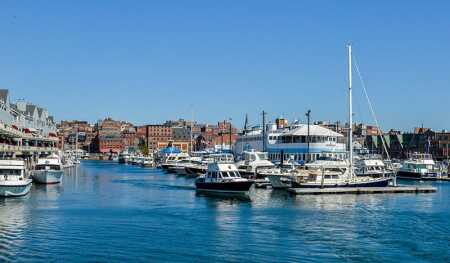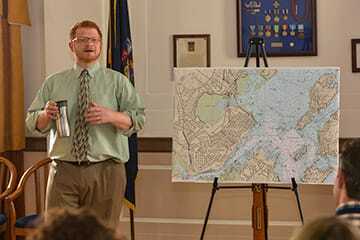ULI conducted the first of a series of special resilience-themed Advisory Services panels in Portland and South Portland, Maine, May 11–16. Supported by the Kresge Foundation, the panel focused on developing strategies to make the two cities’ waterfronts resilient in the face of climate change. The panel’s recommendations provide the cities with an “opportunity to set a [national] footprint,” said panel chair Jim DeFrancia.
The panel tackled the assignment in four parts: first, the panel conducted a high-level scan of the region’s economy to identify opportunities and vulnerabilities; it then outlined a process to define and assess risk; using selected example sites, the panel offered development and planning recommendations to make the waterfronts more adaptive to sea-level rise, storm surges, and flooding; and, finally, it proposed leadership and governance strategies to harness the best and most up-to-date data and to coordinate strategies across cities.
Portland is famous for its fish and lobster industries, which supply its many restaurants. These restaurants, along with a vibrant arts and culture scene, attract some 8 million tourists to the region annually. The panel believes that the city’s reliance on tourism, however, poses a serious economic risk. The panel explained that cities with a diverse economic base are more resilient than cities that rely on one or two industries. If a hurricane or nor’easter were to destroy Portland’s piers and disrupt its fishing and lobster business, for instance, the city’s economy would be severely affected, since the working waterfront is critical to the tourism brand of the area. The panel recommended diversifying the city’s economy by investing in health care, high tech, medical technology, higher education, and arts and culture.
Given the importance of knowing exactly what properties and communities are at risk for climate change—and what specific risks they face—the panel recommended that both cities develop a comprehensive risk assessment. The assessment would identify the region’s most significant risks to residents and businesses and calculate how those risks are changing over time. The risk assessment would also help identify which risks can be easily mitigated and which ones could affect the region’s economic vitality. The panel encouraged the sponsors to consider indirect and direct damage to infrastructure as well as to commercial, industrial, and resident properties. “Risk assessment is the foundation to resilience planning,” said panelist Byron Stigge.
In order to maintain a working waterfront, the panel encouraged the cities to allow the waterfronts to evolve over time. The panel believes that direct development to the piers would act as a physical buffer to storms and allow for economic vitality. The panel provided an approach to consider new development and offered a range of strategies to make the waterfronts more resilient, including amphibious and floating structures, wet floodproofing, and elevation techniques. The panel walked the cities through six example sites to show how the strategies could be employed.
Finally, the panel recommended the creation of a risk data group. The group would serve as a neutral and trusted adviser that sources the best available climate data. It would also be responsible for updating, communicating, and disseminating the data. The local council of governments or major research institutes could house the group. To collaborate and coordinate on joint solutions to shared waterfront concerns, the panel recommended the creation of a resilience working group composed of leaders from the cities’ businesses, nongovernmental organizations, and local governments. The group would be tasked with using the data compiled by the risk data group to assess risk exposure, align and coordinate infrastructure planning, and take a lead on insurance issues.

ULI conducted the first of a series of special resilience-themed Advisory Services panels in Portland and South Portland, Maine, in May 11–16. Supported by the Kresge Foundation, the panel focused on developing strategies to make the two cities’ waterfronts resilient in the face of climate change. (Lipofsky.com)
Creating resilient waterfronts will take public and private leadership, regional coordination, and extensive planning and investment. The panel was encouraged to see both Portland and South Portland already working to make their communities more resilient. The panel is hopeful that its recommendations will spur wider conversation and actions and help make the waterfronts resilient to future events.
Nicholas Lalla is the analyst to the CEO and Chief Content Officer at ULI. There, he assists in the development and management of ULI’s content, including its research centers, initiatives, and advisory services panels.






